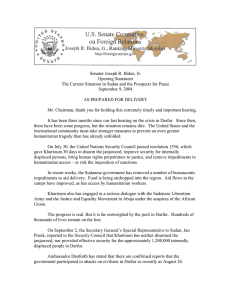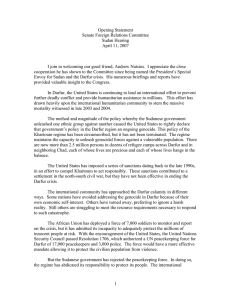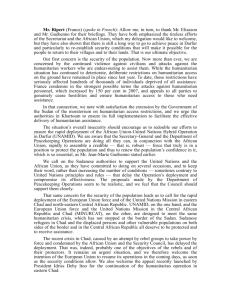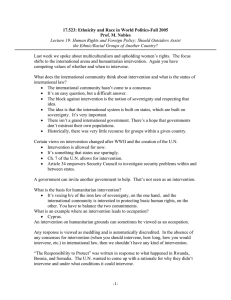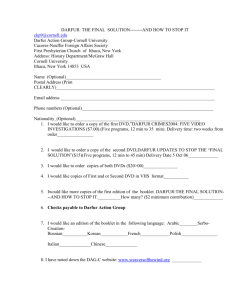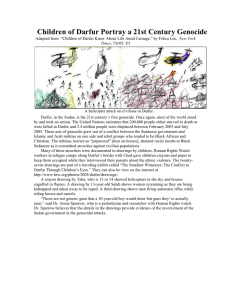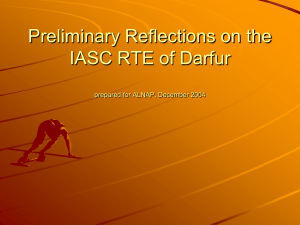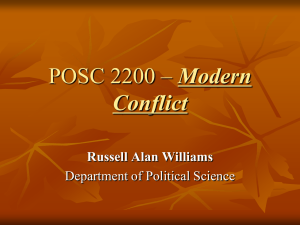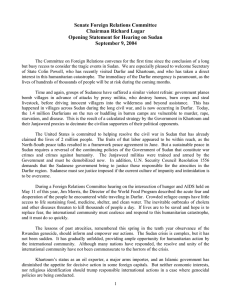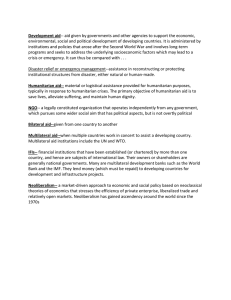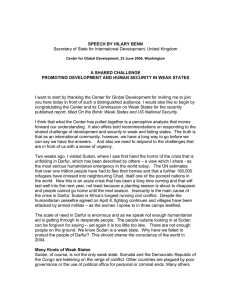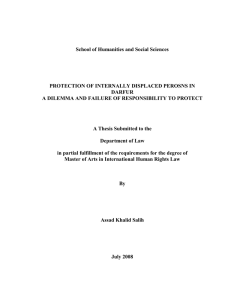Aspirations don't make foreign policy We owe them protection
advertisement
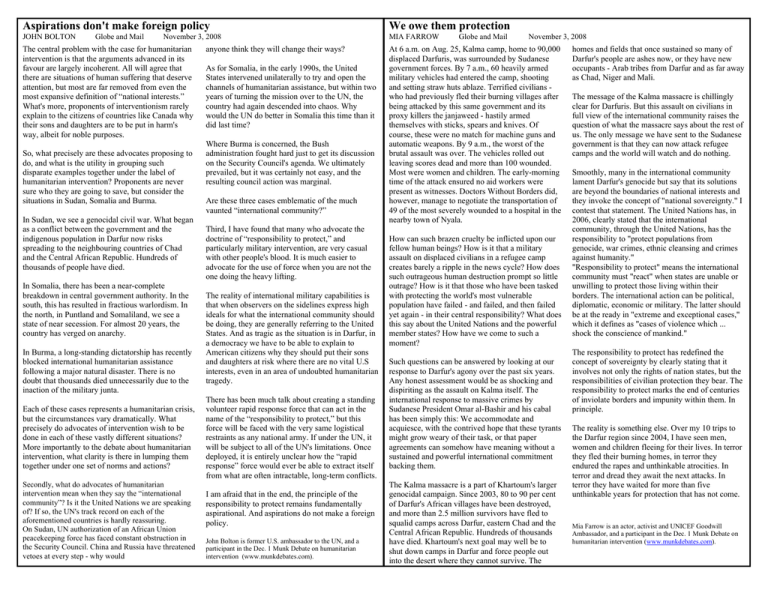
Aspirations don't make foreign policy We owe them protection JOHN BOLTON MIA FARROW Globe and Mail November 3, 2008 The central problem with the case for humanitarian intervention is that the arguments advanced in its favour are largely incoherent. All will agree that there are situations of human suffering that deserve attention, but most are far removed from even the most expansive definition of “national interests.” What's more, proponents of interventionism rarely explain to the citizens of countries like Canada why their sons and daughters are to be put in harm's way, albeit for noble purposes. So, what precisely are these advocates proposing to do, and what is the utility in grouping such disparate examples together under the label of humanitarian intervention? Proponents are never sure who they are going to save, but consider the situations in Sudan, Somalia and Burma. In Sudan, we see a genocidal civil war. What began as a conflict between the government and the indigenous population in Darfur now risks spreading to the neighbouring countries of Chad and the Central African Republic. Hundreds of thousands of people have died. In Somalia, there has been a near-complete breakdown in central government authority. In the south, this has resulted in fractious warlordism. In the north, in Puntland and Somaliland, we see a state of near secession. For almost 20 years, the country has verged on anarchy. In Burma, a long-standing dictatorship has recently blocked international humanitarian assistance following a major natural disaster. There is no doubt that thousands died unnecessarily due to the inaction of the military junta. Each of these cases represents a humanitarian crisis, but the circumstances vary dramatically. What precisely do advocates of intervention wish to be done in each of these vastly different situations? More importantly to the debate about humanitarian intervention, what clarity is there in lumping them together under one set of norms and actions? Secondly, what do advocates of humanitarian intervention mean when they say the “international community”? Is it the United Nations we are speaking of? If so, the UN's track record on each of the aforementioned countries is hardly reassuring. On Sudan, UN authorization of an African Union peacekeeping force has faced constant obstruction in the Security Council. China and Russia have threatened vetoes at every step - why would anyone think they will change their ways? As for Somalia, in the early 1990s, the United States intervened unilaterally to try and open the channels of humanitarian assistance, but within two years of turning the mission over to the UN, the country had again descended into chaos. Why would the UN do better in Somalia this time than it did last time? Where Burma is concerned, the Bush administration fought hard just to get its discussion on the Security Council's agenda. We ultimately prevailed, but it was certainly not easy, and the resulting council action was marginal. Are these three cases emblematic of the much vaunted “international community?” Third, I have found that many who advocate the doctrine of “responsibility to protect,” and particularly military intervention, are very casual with other people's blood. It is much easier to advocate for the use of force when you are not the one doing the heavy lifting. The reality of international military capabilities is that when observers on the sidelines express high ideals for what the international community should be doing, they are generally referring to the United States. And as tragic as the situation is in Darfur, in a democracy we have to be able to explain to American citizens why they should put their sons and daughters at risk where there are no vital U.S interests, even in an area of undoubted humanitarian tragedy. There has been much talk about creating a standing volunteer rapid response force that can act in the name of the “responsibility to protect,” but this force will be faced with the very same logistical restraints as any national army. If under the UN, it will be subject to all of the UN's limitations. Once deployed, it is entirely unclear how the “rapid response” force would ever be able to extract itself from what are often intractable, long-term conflicts. I am afraid that in the end, the principle of the responsibility to protect remains fundamentally aspirational. And aspirations do not make a foreign policy. John Bolton is former U.S. ambassador to the UN, and a participant in the Dec. 1 Munk Debate on humanitarian intervention (www.munkdebates.com). Globe and Mail November 3, 2008 At 6 a.m. on Aug. 25, Kalma camp, home to 90,000 displaced Darfuris, was surrounded by Sudanese government forces. By 7 a.m., 60 heavily armed military vehicles had entered the camp, shooting and setting straw huts ablaze. Terrified civilians who had previously fled their burning villages after being attacked by this same government and its proxy killers the janjaweed - hastily armed themselves with sticks, spears and knives. Of course, these were no match for machine guns and automatic weapons. By 9 a.m., the worst of the brutal assault was over. The vehicles rolled out leaving scores dead and more than 100 wounded. Most were women and children. The early-morning time of the attack ensured no aid workers were present as witnesses. Doctors Without Borders did, however, manage to negotiate the transportation of 49 of the most severely wounded to a hospital in the nearby town of Nyala. How can such brazen cruelty be inflicted upon our fellow human beings? How is it that a military assault on displaced civilians in a refugee camp creates barely a ripple in the news cycle? How does such outrageous human destruction prompt so little outrage? How is it that those who have been tasked with protecting the world's most vulnerable population have failed - and failed, and then failed yet again - in their central responsibility? What does this say about the United Nations and the powerful member states? How have we come to such a moment? Such questions can be answered by looking at our response to Darfur's agony over the past six years. Any honest assessment would be as shocking and dispiriting as the assault on Kalma itself. The international response to massive crimes by Sudanese President Omar al-Bashir and his cabal has been simply this: We accommodate and acquiesce, with the contrived hope that these tyrants might grow weary of their task, or that paper agreements can somehow have meaning without a sustained and powerful international commitment backing them. The Kalma massacre is a part of Khartoum's larger genocidal campaign. Since 2003, 80 to 90 per cent of Darfur's African villages have been destroyed, and more than 2.5 million survivors have fled to squalid camps across Darfur, eastern Chad and the Central African Republic. Hundreds of thousands have died. Khartoum's next goal may well be to shut down camps in Darfur and force people out into the desert where they cannot survive. The homes and fields that once sustained so many of Darfur's people are ashes now, or they have new occupants - Arab tribes from Darfur and as far away as Chad, Niger and Mali. The message of the Kalma massacre is chillingly clear for Darfuris. But this assault on civilians in full view of the international community raises the question of what the massacre says about the rest of us. The only message we have sent to the Sudanese government is that they can now attack refugee camps and the world will watch and do nothing. Smoothly, many in the international community lament Darfur's genocide but say that its solutions are beyond the boundaries of national interests and they invoke the concept of "national sovereignty." I contest that statement. The United Nations has, in 2006, clearly stated that the international community, through the United Nations, has the responsibility to "protect populations from genocide, war crimes, ethnic cleansing and crimes against humanity." "Responsibility to protect" means the international community must "react" when states are unable or unwilling to protect those living within their borders. The international action can be political, diplomatic, economic or military. The latter should be at the ready in "extreme and exceptional cases," which it defines as "cases of violence which ... shock the conscience of mankind." The responsibility to protect has redefined the concept of sovereignty by clearly stating that it involves not only the rights of nation states, but the responsibilities of civilian protection they bear. The responsibility to protect marks the end of centuries of inviolate borders and impunity within them. In principle. The reality is something else. Over my 10 trips to the Darfur region since 2004, I have seen men, women and children fleeing for their lives. In terror they fled their burning homes, in terror they endured the rapes and unthinkable atrocities. In terror and dread they await the next attacks. In terror they have waited for more than five unthinkable years for protection that has not come. Mia Farrow is an actor, activist and UNICEF Goodwill Ambassador, and a participant in the Dec. 1 Munk Debate on humanitarian intervention (www.munkdebates.com).
